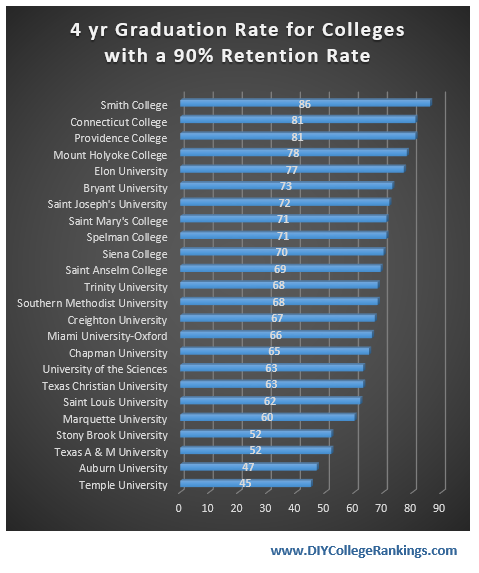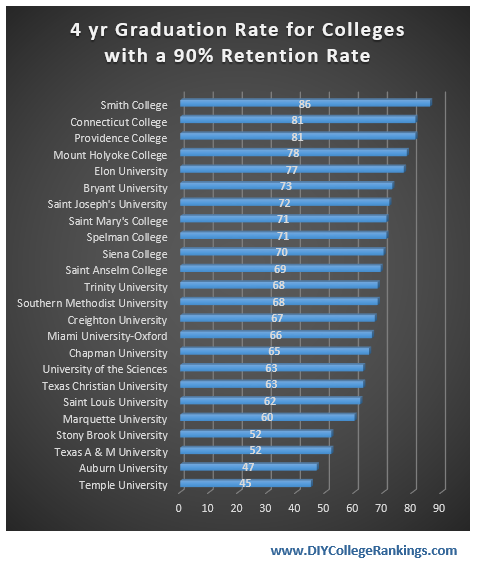 Anyone who reads my blog for a while will realize that I have a thing about college graduation rates. One of the “50’s” in my 50-50 schools is graduation rates. And I can’t say it’s just something I started paying attention to as my son got closer to college. My master’s report was on high school graduation rates. Yeah, I was playing with graduation rates before most people ever heard of them. So no one should be surprised that I want to be clear about the difference between graduation rates and freshman retention rates and why it matters.
Anyone who reads my blog for a while will realize that I have a thing about college graduation rates. One of the “50’s” in my 50-50 schools is graduation rates. And I can’t say it’s just something I started paying attention to as my son got closer to college. My master’s report was on high school graduation rates. Yeah, I was playing with graduation rates before most people ever heard of them. So no one should be surprised that I want to be clear about the difference between graduation rates and freshman retention rates and why it matters.
Join other parents in the Coffee Cup College Planning Facebook Group
Retention Rates vs Graduation Rates
Freshman retention rates are just what they sound like, the percentage of full-time freshman that return for the following year. Sometimes you’ll see them referred to as “freshman satisfaction” rates because you can’t expect people who are planning to get a college degree to understand it otherwise, right? Graduation rates are the percentage of full-time freshman that actually graduate from the college in a four, five, or six-year period.
Most colleges will be happy to give you their retention rates but will give you all kinds of explanations of the limitations of using graduation rates. I’ve talked about these limitations and what they mean to families here, here, here, here, and here. The short version–you should use graduation rates.
Why Do Colleges Love Retention Rates?
The reason for the focus on retention rates is because by definition, they’re going to be better than the four-year graduation rate. Think about it. The students who left the school aren’t going to graduate from the college. The next three years only means the possibility of more students leaving so the graduation rate will be lower.
Alright, theoretically, students could leave, come back after a semester or two, take a bunch of summer school classes, and still graduate in four-years. Not very likely but nonetheless, a possibility. And these would actually have a good chance of being captured in the six-year graduation rate, the most commonly used. But the only times I’ve seen graduation rates higher than retention rates were obvious data errors.
Just how different are retention rates from graduation rates?
Let’s take my 50-50 schools. I define 50-50 schools as institutions that accept at least 49% of their applicants and have at least a 49% graduation rate. I use the five-year rate for public schools and the four-year rate for private schools. This past year, out of over 1,500 colleges and universities with over 500 full-time undergraduates, only 451 met the 50-50 requirements.
Now if I substitute the retention rate for the graduation rate, the number of 50-50 schools increases to 1,471. Of the 142 schools that didn’t make the list, 113 didn’t report the retention rate. Of course schools are going to prefer using the freshman retention rate.
Good Retention Rates Does Not Always Mean Good Graduation Rates
Now if you’re thinking the retention rate would correlate with the graduation rate, this would generally be true. But families aren’t looking at average schools, they’re looking at specific schools and it might make a difference to them if the four-year graduation rate is actually 50 points lower than the retention rate which is the case for 342 schools.
In fact, according to the Integrated Postsecondary Education Data System (IPEDS), 1,122 colleges with 500 or more full-time undergraduates have a 25 or more point difference between the retention rate and the four-year rate. These retention rates range from 32% to 100%.
Just to give you an idea of the variation in graduation rates, the following graph shows the five-year graduation rate for colleges that reported a 90% retention rate.

Of the 24 schools with a 90% retention rate, only three have a four-year graduation rate of 80% or better. The majority, 14, had graduation rates less than 70%. Is this what the average family expects when a colleges tells them their freshman satisfaction (retention rate) is 90%?
CONNECT WITH OTHER PARENTS PLANNING FOR COLLEGE
JOIN THE COFFEE CUP COLLEGE PLANNING FACEBOOK GROUP


5 thoughts on “Why You Should Pay More Attention to College Graduation Rates Rather Than Retention Rates”